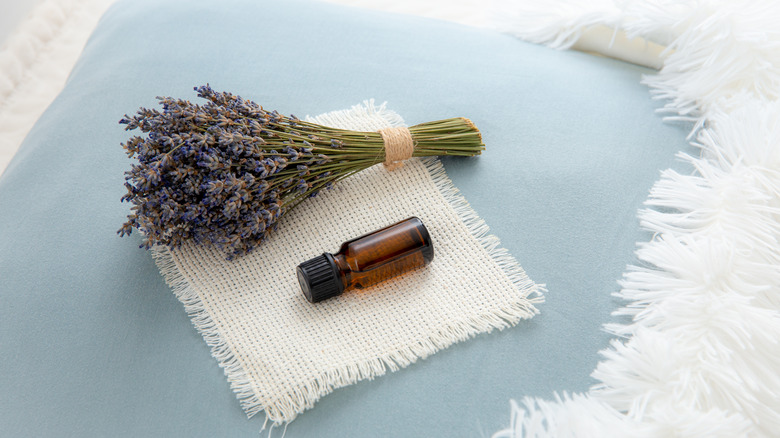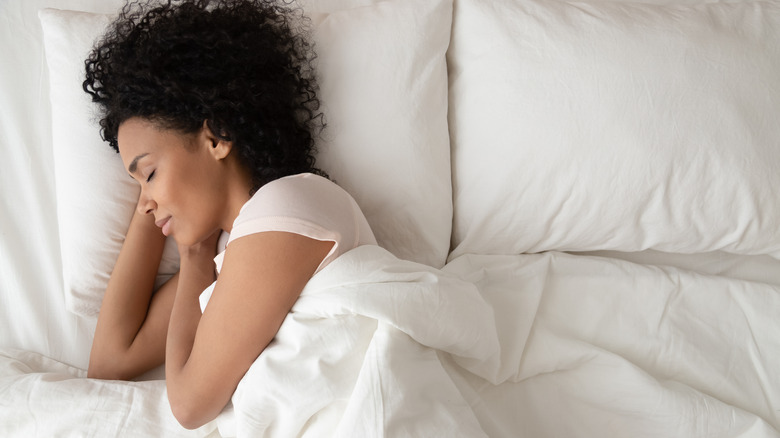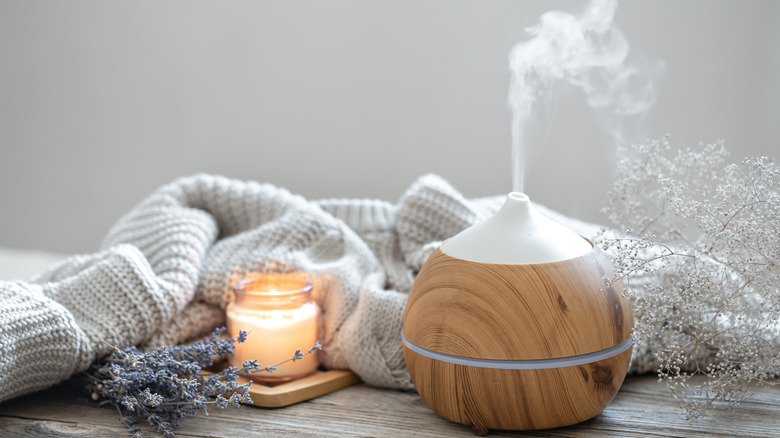Essential Oils You Need To Get Better Sleep
If you struggle to get the recommended 7-9 hours of sleep each night, you're not alone. According to the CDC, 1 in 3 adults don't get enough sleep on a consistent basis. So what's the best approach to optimizing our sleep routines? If you're like many, you may have considered solutions like sleep aids, melatonin supplements, or even a glass of wine in the evenings. While some of these solutions may help us fall asleep, they may not help us stay asleep and may actually create unwanted dependencies. As a result, many have turned toward more natural approaches like essential oils to help bolster sleep, and for good reason. They've been used for centuries across many cultures, including ancient Egyptians who used aromatic oils as early as 4500 B.C. for various cosmetics and ointments, according to BioMed Research International. Today they remain a low-cost, generally low-risk way to improve our sleep without forming chemical dependencies. Think it's all in our heads? Clinical evidence suggests otherwise. A 2019 randomized control study published in The Journal of Alternative and Complementary Medicine found that sleep quality of participants receiving essential oils was significantly better than those receiving the placebo, thereby concluding that aromatherapy is an effective method for improving sleep quality.
The best essential oils for sleep
Strong clinical and anecdotal evidence suggest essential oils, including lavender, sweet orange, sandalwood, valerian, peppermint, bergamot, chamomile, cedarwood, marjoram, clary sage, ylang-ylang, and jasmine are most effective for supporting a good night's sleep, via Amerisleep. Depending on which factors inhibit your sleep, you may want to use one essential oil over another. For example, lavender is a flower containing two powerful compounds: linalool and linalyl acetate, associated with calming the nervous system (via Sleep Foundation). A 2017 study published in the British Association for Critical Care Nurses journal found that lavender increased sleep quality and reduced anxiety for intensive care unit patients subject to poor sleep quality. If you tend to have stress or anxiety while trying to drift off to sleep, lavender may be just the thing for you. Another popular method for using essential oils is to blend two or several together to increase their potency. A 2019 study published in the BMC Complementary Medicine and Therapies journal found that Anshen (an essential oil blend of lavender, sweet orange and sandalwood) had potent sedative and hypnotic effects that helped increase sleep quantity in animal studies.
How to use them
There are different ways to use essential oils and you may want to try different methods to find one that works best for you. Essential oils can be purchased as ready-to-use room sprays, pillow and linen sprays, candles, oils for diffusers, personal care products like body oil or lotion, and bath oils or salts, to name a few. While these are convenient ways to incorporate essential oils easily, you can also purchase pure essential oils and mix and vary the way you use them. As a general rule of thumb, whenever trying a new product directly on your skin, be sure to exercise caution. Because essential oils are highly potent, concentrated plant compounds, it's always a good practice to perform a skin patch test in order to assess potential skin sensitivities or allergies, via Healthline. Other common ways to use essential oils before bed include adding a few drops to a spray bottle along with water and spritzing your linens; adding a few drops to a warm bath; enhancing your favorite nighttime lotion with essential oils of choice; and running a diffuser in your bedroom 20 minutes before bedtime, via Amerisleep.



